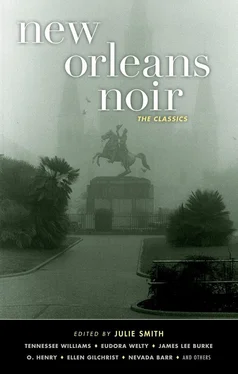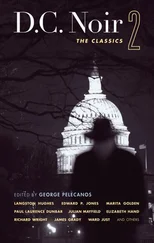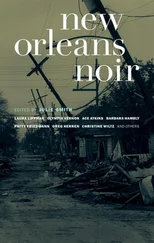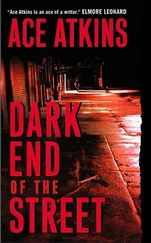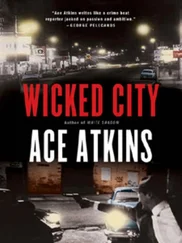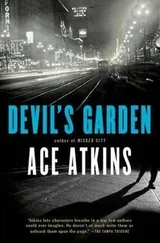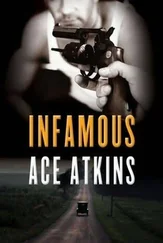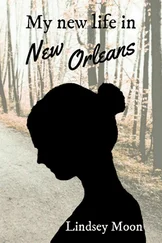Ace Atkins - New Orleans Noir - The Classics
Здесь есть возможность читать онлайн «Ace Atkins - New Orleans Noir - The Classics» весь текст электронной книги совершенно бесплатно (целиком полную версию без сокращений). В некоторых случаях можно слушать аудио, скачать через торрент в формате fb2 и присутствует краткое содержание. Город: New York, Год выпуска: 2016, ISBN: 2016, Издательство: Akashic Books, Жанр: Детектив, на английском языке. Описание произведения, (предисловие) а так же отзывы посетителей доступны на портале библиотеки ЛибКат.
- Название:New Orleans Noir: The Classics
- Автор:
- Издательство:Akashic Books
- Жанр:
- Год:2016
- Город:New York
- ISBN:978-1-61775-384-8
- Рейтинг книги:3 / 5. Голосов: 1
-
Избранное:Добавить в избранное
- Отзывы:
-
Ваша оценка:
- 60
- 1
- 2
- 3
- 4
- 5
New Orleans Noir: The Classics: краткое содержание, описание и аннотация
Предлагаем к чтению аннотацию, описание, краткое содержание или предисловие (зависит от того, что написал сам автор книги «New Orleans Noir: The Classics»). Если вы не нашли необходимую информацию о книге — напишите в комментариях, мы постараемся отыскать её.
takes a literary tour through some of the darkest writing in New Orleans history.
New Orleans Noir: The Classics — читать онлайн бесплатно полную книгу (весь текст) целиком
Ниже представлен текст книги, разбитый по страницам. Система сохранения места последней прочитанной страницы, позволяет с удобством читать онлайн бесплатно книгу «New Orleans Noir: The Classics», без необходимости каждый раз заново искать на чём Вы остановились. Поставьте закладку, и сможете в любой момент перейти на страницу, на которой закончили чтение.
Интервал:
Закладка:
“Looks like a good shooting,” Sergeant Mark Land told LaStanza when he arrived at the Homicide office. “Looks like our man had no choice.”
LaStanza sat heavily in his chair and didn’t answer.
Big, burly, and Italian, with thick dark hair and a full mustache, Mark looked like an oversized version of LaStanza. Grinning broadly, the sergeant pulled up Snowood’s chair and began to run down the patrolman’s statement in detail, but LaStanza wasn’t listening. He was thinking about the faded bricks of the old Cotton Exchange and the rusted drain pipes and all the lonely nights spent looking up at an empty sky.
When Mark finished, he yawned and said, “Shit, we’ll be outta here in no time.”
LaStanza leaned back in his chair and closed his eyes, but only for a moment.
“Say, boy, what’s wrong wit’ you?” Snowood called out as he approached. “You been acting spooky.”
“It’s nothing.”
“Don’t give me that shit. What’s the matter?”
“Nothing, I told you.” LaStanza scooped up his black coffee mug with its small inscription that read: FUCK THIS SHIT! He moved over to the coffeepot and poured the hot coffee-and-chicory into his mug, then filled his sergeant’s cup when Mark stepped up. The young patrolman moved up with a Styrofoam cup. LaStanza put the pot down and turned away.
“Something wrong?” the patrolman asked in a shaky voice.
“No,” Mark answered quickly.
LaStanza turned back and looked at the patrolman, noticing how the man’s hand shook when he poured the coffee.
“He pulled the same gun on me a couple years ago,” LaStanza said.
“What?” Mark said as he nearly spilled his coffee.
LaStanza took in a deep breath before adding, “That was the Man with Moon Hands.”
“I’ll be damned!” Mark did spill his coffee this time. Switching his cup to his other hand, he turned to the patrolman and said, “You killed a legend tonight, pal.”
“What are y’all yakkin’ about?” Snowood asked from his desk.
“Your victim was the Man with Moon Hands,” Mark told him.
“No shit?”
LaStanza watched the patrolman’s eyes. There was confusion there, along with a touch of fear.
“You never heard of the Man with Moon Hands?” Mark asked the patrolman.
“No,” the man answered softly. “I’ve only been on the road six months.”
“He was the most famous 103M in the city.”
“At least we know who he is now,” Snowood injected. “Sumbitch had no ID on him.”
“He was a 103M?” the patrolman asked LaStanza, who did not respond. Turning back to Mark, the patrolman added, “He did look weird.”
“What was his name?” Snowood asked his partner.
“I don’t remember,” LaStanza answered, still watching the patrolman, “but it’s gotta be in the computer.”
“Well I’ll be,” the patrolman sighed in relief. “He was crazy!”
LaStanza couldn’t stop his voice from sounding vicious: “You couldn’t see that?”
“What am I,” the patrolman snapped back, “a psychiatrist?” He seemed stunned.
LaStanza gave him the Sicilian stare, the one that went straight through to the back of the man’s skull. Then he walked to his desk and flopped in his chair.
The exasperated patrolman continued explaining to Mark, “He looked right at me and pointed the gun and zapped me.” The patrolman’s voice began to rise as he followed the sergeant back into the interview room. “How’d he get the gun back anyway?”
“Goddamn courts release everything nowadays,” Mark growled angrily.
LaStanza was finishing his daily report when the patrolman approached. Snowood had gone to the computer to try to identify the Man with Moon Hands.
“Excuse me, Detective LaStanza. Can I have a word with you?” The patrolman looked like a dog lost out in the rain.
LaStanza nodded to his partner’s empty chair.
The patrolman’s voice was almost a whisper: “I didn’t know he was... a legend.”
“He was a second-generation clone.”
“What?”
“Forget it.”
The patrolman’s hands were shaking again. He looked like he wanted to run away. Gulping, he managed to say, “How was I supposed to know?”
LaStanza said nothing.
“He pointed a gun at me.”
“You didn’t see a tall man with thick glasses near the alley, did you?”
“No.” The patrolman looked back anxiously.
LaStanza just nodded and returned to his daily.
After a minute, the whisper voice of the patrolman came back: “When he drew down on you, why didn’t you shoot him?”
There it was again, the intangible. How do you explain what couldn’t be explained? How do you explain what was incapable of even being comprehended by the mind, incapable of being distinguished by any of the senses? How do you explain something like that?
LaStanza knew he could not. You just knew.
Peering back into a pair of searching eyes, LaStanza recognized something. He recognized a look. It was a look that said, I’ve got something to live with for the rest of my life. He’d seen that same look in his own mirror.
“I passed the shoot-don’t-shoot class with an A at the academy,” the patrolman said in a strained voice.
“Some things can’t be taught,” LaStanza said finally. “Some things can’t even be explained. You just know.”
“You didn’t shoot him and I did,” the patrolman said. “Why?”
“I just knew.”
It was as if he’d reached over and slapped the patrolman across the face. It took a second for the man to recover. He looked away from LaStanza’s eyes and took in a couple breaths before asking, “Do you think I’ll have any trouble with the grand jury?”
“Don’t worry about it,” LaStanza heard himself say. “It was a good shooting.”
This story is for Josie.
Rose
by John Biguenet
(Originally published in 1999)
Gentilly
“It must have been, I think she said, two years after the kidnapping when your wife first came by.” The voice on the phone sounded young. “What was that, ’83, ’84?”
“Kidnapping?”
“Yeah, she told me all about it, how it was for the private detective you hired after the police gave up.”
“You mean the picture?”
“Right, the age progression.”
“You could do it back then?”
“It was a pain in the ass. You had to write your own code. But, yeah, once we had the algorithms for stuff like teeth displacement of the lips, cartilage development in the nose and ears, stuff like that, all you had to do was add fat-to-tissue ratios by age, and you wound up with a fairly decent picture of what the face probably looked like. I mean, after you tried a couple different haircuts and cleaned up the image — the printers were a joke in those days.”
“And you kept updating Kevin’s...” He hesitated as he tried to remember the term. “Kevin’s age progression?”
“Every year, like clockwork, on October 20. Of course, the new ones, it’s no comparison. On-screen, we’re 3-D now; the whole head can rotate. And if you’ve got a tape of the kid talking or singing, there’s even a program to age the voice and sync it with the lips. You sort of teach it to talk, and then it can say anything you want, the head.”
The voice was waiting for him to say something.
“I mean, we thought it was cool, Mr. Grierson, the way you two didn’t lose hope you’d find your boy one day. Even after all these years.”
He hung up while the man was still talking. On the kitchen table, the photo album Emily had used to bind the pictures, the age progressions, lay open to one that had the logo and phone number of Crescent CompuGraphics printed along its border. His son looked fifteen, maybe sixteen, in the picture.
Читать дальшеИнтервал:
Закладка:
Похожие книги на «New Orleans Noir: The Classics»
Представляем Вашему вниманию похожие книги на «New Orleans Noir: The Classics» списком для выбора. Мы отобрали схожую по названию и смыслу литературу в надежде предоставить читателям больше вариантов отыскать новые, интересные, ещё непрочитанные произведения.
Обсуждение, отзывы о книге «New Orleans Noir: The Classics» и просто собственные мнения читателей. Оставьте ваши комментарии, напишите, что Вы думаете о произведении, его смысле или главных героях. Укажите что конкретно понравилось, а что нет, и почему Вы так считаете.
